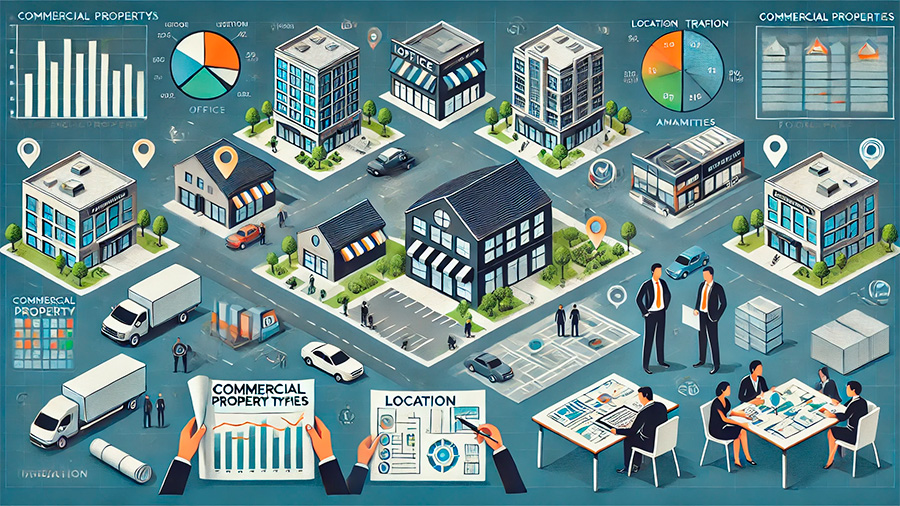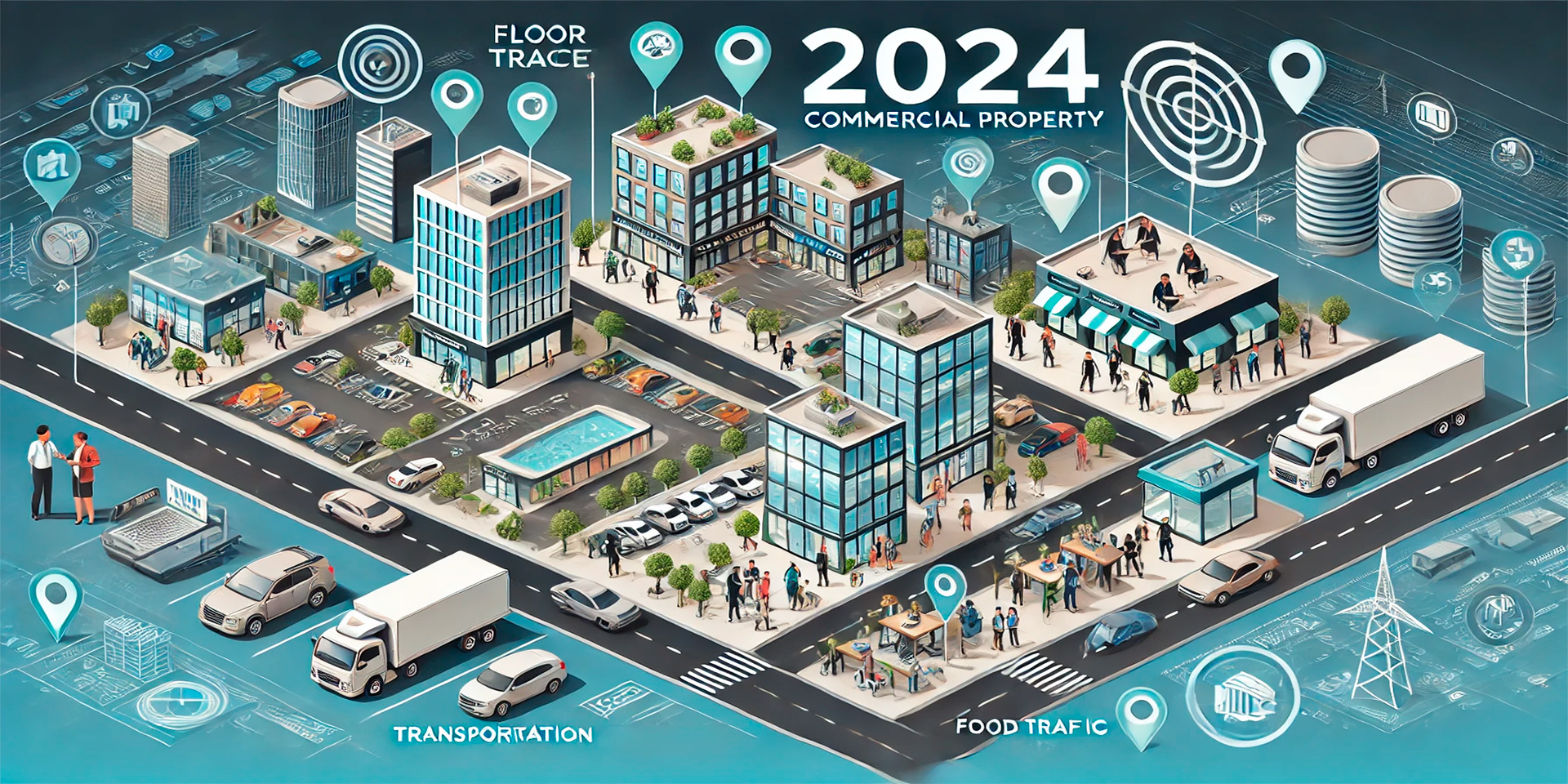Finding the right commercial property is a critical decision that can significantly influence the success of your business. Whether you’re starting a new venture or expanding your operations, the location, size, and features of the space you lease or buy can impact everything from foot traffic to operational efficiency. In 2024, with evolving market trends and increasing demands for flexible and sustainable spaces, it’s more important than ever to know how to select a property that fits your business needs. This guide will walk you through the key factors to consider when searching for the perfect commercial property.
Understanding Your Business’s Needs
Before diving into the search for commercial property, it’s essential to have a clear understanding of your business’s unique needs. Consider both your current requirements and potential future growth, as this will help you choose a space that not only fits your business now but also allows room for expansion.
Define Your Space Requirements
The first step in finding the perfect commercial property is determining how much space you need. Depending on your industry, your space requirements can vary greatly. For example, a retail store will need ample floor space for merchandise and customers, while a tech company may prioritize open work areas, meeting rooms, and space for collaborative work.
- Office Needs: If you’re looking for office space, think about how many employees you have, how they work, and the type of environment that supports productivity. Will you need private offices, open areas for collaboration, or conference rooms for meetings?
- Storage and Operational Needs: For businesses such as restaurants, warehouses, or retail, you’ll also need to consider storage space, loading docks, or kitchen space as part of your requirements.
- Future Growth: Plan for your business’s growth by selecting a property that allows for expansion. Leasing or buying a property that’s too small now may require you to relocate sooner than expected, leading to additional costs and disruptions.
Identify the Desired Location
Location is one of the most important factors when choosing commercial property, as it directly affects your business’s visibility, accessibility, and operational costs. A prime location can attract customers, improve your brand’s image, and make it easier for employees to commute.
- Customer Accessibility: If you rely on walk-in traffic, such as retail stores or restaurants, choosing a location with high foot traffic is essential. Being located near popular shopping areas, public transit, or major roads can make your business more accessible to customers.
- Proximity to Suppliers or Partners: For businesses with frequent deliveries or partnerships, proximity to suppliers or transportation hubs can streamline operations and reduce logistical costs.
- Neighborhood Dynamics: The character of the neighborhood where your business is located can impact your brand. Consider whether the area aligns with your business image and target market. For example, trendy urban areas may attract younger customers, while suburban locations might be better suited for family-oriented businesses.

Evaluating Commercial Property Types
Different types of commercial properties are available depending on the nature of your business. It’s important to choose a type that aligns with your operational needs and long-term goals.
Retail Space
Retail spaces are designed for businesses that sell products or services directly to consumers. These properties are often located in shopping centers, strip malls, or high-traffic downtown areas. When evaluating retail space, consider the visibility, foot traffic, and accessibility of the location, as these factors will have a direct impact on sales.
- Visibility: Retail locations with prominent signage and visibility from main roads or busy pedestrian areas are ideal for attracting walk-in customers.
- Size and Layout: Ensure that the layout of the space allows for effective product displays and a comfortable shopping experience for your customers. You may also need storage space for inventory.
Office Space
Office spaces are ideal for businesses that need a professional environment for administrative work, client meetings, or team collaboration. When choosing an office space, think about the layout, technology infrastructure, and amenities needed to support your team.
- Layout Flexibility: Modern businesses often require adaptable workspaces, such as open floor plans that can be reconfigured as the company grows.
- Amenities: Consider amenities such as parking, conference rooms, and on-site dining options, which can enhance employee satisfaction and productivity.
Industrial or Warehouse Space
Industrial properties are typically used for manufacturing, storage, or distribution. These spaces require specific features, such as loading docks, high ceilings, and large open areas to accommodate heavy equipment and inventory.
- Zoning Requirements: Check that the property is zoned for industrial use and that it meets any specific regulatory requirements for your industry.
- Operational Efficiency: The layout and location should support your business’s operational needs, whether it’s easy access to transportation routes or sufficient storage capacity for large inventories.
Financial Considerations for Commercial Leasing or Buying
Leasing or purchasing commercial property involves significant financial considerations. Understanding the costs involved and choosing the best financial arrangement for your business is essential to avoid unexpected expenses down the line.
Lease vs. Purchase
One of the first financial decisions you’ll need to make is whether to lease or buy commercial property. Each option has its advantages and disadvantages depending on your long-term plans, available capital, and risk tolerance.
- Leasing: Leasing a commercial space offers flexibility, especially if your business is growing or if you’re uncertain about your long-term space requirements. Leasing typically requires a lower upfront investment and allows businesses to relocate or expand more easily. However, rent payments do not build equity, and leases may include annual rent increases.
- Buying: Purchasing commercial property allows you to build equity over time and provides more control over the space. While the upfront costs are higher, owning property can be a smart long-term investment for stable businesses. Buying also protects you from rent increases and gives you the freedom to customize the space to fit your exact needs.
Understanding Lease Terms
If you decide to lease, it’s crucial to carefully review the lease terms and understand any financial obligations you’ll have as a tenant.
- Rent and Rent Increases: Commercial leases often include rent escalation clauses, where rent increases by a certain percentage each year. Ensure that you factor in potential rent increases when calculating your long-term budget.
- Maintenance Costs: Some commercial leases are triple net (NNN) leases, meaning tenants are responsible for property taxes, insurance, and maintenance costs in addition to rent. Understand the full financial responsibilities associated with the lease before signing.
- Lease Duration and Renewal Options: Look for leases that offer flexibility, such as the option to renew at a predetermined rate. This gives you the security of staying in the space while providing the opportunity to renegotiate terms as your business evolves.
Zoning, Regulations, and Legal Considerations
Before finalizing any commercial property deal, it’s important to ensure that the property is zoned for your intended use and complies with local regulations.
Zoning Restrictions
Commercial properties are subject to zoning laws that dictate how the space can be used. Make sure that the property you’re considering is zoned for your type of business, whether it’s retail, office, or industrial.
Example: If you’re opening a restaurant, the property must be zoned for food service and meet health and safety codes related to food handling and public occupancy.
Building Permits and Code Compliance
If you plan to make any modifications or renovations to the commercial space, ensure that the property complies with local building codes and that the necessary permits are obtained. This may include electrical, plumbing, and structural upgrades required for your business operations.
Example: A tech company installing a server room may need to upgrade the building’s electrical system, which requires compliance with local regulations and permits from the city.
 Sustainability and Energy Efficiency in Commercial Properties
Sustainability and Energy Efficiency in Commercial Properties
With sustainability becoming an increasing priority for businesses, many are looking for commercial properties that align with their environmental goals. Energy-efficient buildings can also help reduce long-term operational costs.
Green Building Certifications
Look for commercial properties with certifications like LEED (Leadership in Energy and Environmental Design) or ENERGY STAR, which indicate that the building meets high standards for energy efficiency and environmental sustainability. Green buildings are not only better for the environment but can also lead to lower utility costs and may qualify your business for tax credits or incentives.
Energy-Efficient Systems
Assess the property’s existing infrastructure to determine its energy efficiency. Features like energy-efficient HVAC systems, LED lighting, and solar panels can significantly reduce operating costs over time. Sustainable properties are also attractive to employees and customers, who increasingly value eco-friendly business practices.
Working with Professionals to Find the Perfect Space
Finding the right commercial property can be a complex process, especially when considering factors like location, zoning, and financial terms. Working with experienced professionals can help streamline the process and ensure that you find a space that meets your needs.
Commercial Real Estate Brokers
A commercial real estate broker with local market expertise can help you identify properties that meet your requirements, negotiate lease or purchase terms, and guide you through the legal and financial aspects of the deal. Brokers have access to a wide range of listings, including off-market properties, giving you more options to choose from.
Legal and Financial Advisors
Consulting with a real estate attorney and financial advisor is essential to ensure that your lease or purchase agreement protects your interests. They can review the terms, ensure compliance with local laws, and help you understand the full financial implications of the deal.
Conclusion: Securing the Perfect Commercial Property for Your Business
Finding the perfect commercial property requires careful consideration of your business’s current and future needs, the location, financial costs, and legal requirements. By clearly defining your space requirements, exploring the best locations, and understanding the financial and legal aspects of commercial leasing or purchasing, you can secure a property that supports your business’s long-term success. With the right strategies and professional guidance, your business will be well-positioned to thrive in its new space.




